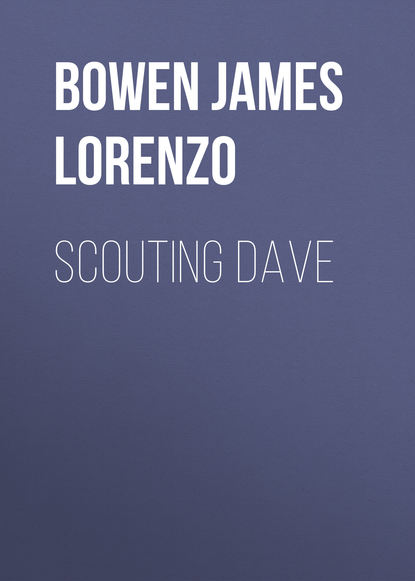По всем вопросам обращайтесь на: info@litportal.ru
(©) 2003-2025.
✖
Scouting Dave
Настройки чтения
Размер шрифта
Высота строк
Поля
“Was the prisoner taken near this place?” Emily questioned, her interest becoming still greater.
“Not fur away, I should tek’ it!” was the reply. “A party set out tew jine the people acrost the river, an’, in about tew hours, cum’ back with this chap. I’m kind o’ sorry fer him; but he orter l’arn wisdom, an’ I guess he will when he gits out o’ this.”
“But how came he to be so near? What was he doing on this side of the river?” Emily asked, her suspense overcoming all other feelings.
The woman noticed the anxiety of the maiden, and all communicativeness was at an end.
“I don’t know,” she replied, abruptly. “I believe he had one or two companions, what got shot; but that’s all I knows. Breakfast’s ready.”
Poor Emily! She wished for nothing to eat; so, merely saying that she desired none, she was left alone with all her fearful doubts and surmises. She knew not that Sally had fabricated the last portion of her story, merely to add to the poor captive’s sufferings!
CHAPTER IX.
A TASTE OF THE STICKS
As early morning broke over the earth, two persons stood upon an eminence which overlooked the Indian village where Ashbey had taken up his residence. So close were they, that scarce two hundred yards separated them from the very cabin which contained Emily. These persons were none other than David Barring and his ally, Charles Markley. The former was pointing out to his companion the cabin of the renegade, and they were anxiously watching for any sign which should assure them that the one they sought was a prisoner within.
Was she there! If so, how long before they could rescue her? For the thought of failure never entered the lover’s heart. Suddenly, from every hut and wigwam, poured forth a host of savages, young, old, and heterogeneous, taking their noisy way toward the lower portion of the village.
As the three whites had approached the village, Alfred Markley had preferred an earnest request that he might be allowed to make the circuit of it, hoping to discover something of advantage to himself and companions. To this request, the scout had granted a ready consent – really supposing but little danger would exist at an hour so early.
Alfred set out joyously, fully confident of rejoining his companions within an hour. He had found the way more rough and obstructed than anticipated; so that, in order to keep the village in view, and exercise due caution, he was obliged to proceed very slowly. For this he cared but little, rather preferring to await the time when the people would be astir, as the sanguine fellow more than half fancied he would thus be enabled to see the prisoner.
A war-party of Indians, eager for the trail, had left the village a few moments before the three adventurers reached the vicinity. No sooner were they beyond the reach of other eyes, than their ardour cooled, and the entire party loitered about, until the light footfall of Alfred fell upon their keen ears. Without the least commotion, they instantly glided into cover.
All unsuspicious of danger, Alfred walked directly into the trap. He had been obliged to make a slight detour, in order to avoid some obstacles in his way. This had taken him more deeply into the forest. The first premonitions he felt of danger, was upon noticing some dusky form glide from tree to tree. What it was, he could not tell; but, knowing he was in danger, he darted behind another tree, only to find himself face to face with a hideously-painted savage!
Alfred was not the man to be tamely caught. His rifle was in his hand, and, darting back a pace, he delivered the astonished native a blow which ended his war-path forever, and transplanted him at once to the happy hunting-grounds of his forefathers. Scarcely had the blow descended, when three or four athletic braves hurled themselves upon the youth. Dropping his rifle as he fell, Alfred drew his hunting-knife, and, as an assailant exposed his breast, it was buried in his bosom.
A despairing yell arose from the Indians, as a third received a severe cut, and the remaining two, who were hurrying toward the scene, paused, dismayed. Putting forth all his strength, the youth shook himself from those who held him, and stood, for a moment, free. Ere he could realize the fact, a heavy blow from behind felled him to the ground, and, in a moment, he was bound, hand and foot.
Leaving their slain companions, the Indians made their way into the village, sending the wounded brave before them to bear the joyful tidings. As the clamorous multitude rushed about him, Alfred nerved himself for the worst.
As the word was given, he set his teeth, braced his nerves, and bounded forward like a deer. The young settler was strong of limb, and very active. None were fleeter of foot than he, and the speed with which he set forth, fairly astonished the warriors themselves. Nearly half the line was passed before the blows seemed to touch him. Then, as they came with more effect, he staggered beneath their weight. His strength proved sufficient, however, and he reached the end of the line, smarting and bruised, yet with a spirit unbroken. A yell from the Indians showed their appreciation of the sport, as the prisoner was led away to a place of security.
Upon the outskirts of the village was a strong, dark old cabin, built of logs, and covered with bark. The structure was clumsily formed, but solid, and the door so constructed as to bar heavily upon the outside.
This above-ground dungeon was opened, and Alfred, securely bound, was thrust in. The savages took a hasty survey, and, finding the place secure, set a guard and departed.
The prisoner’s arms and shoulders were bruised and swollen, while his head throbbed and ached fearfully. He endeavoured to think calmly of himself and companions, but the effort was too much, and he bowed his head with a groan.
* * * * * * * *
“I’m afeard they’ve got Alf,” said David, with a shake of the head.
Charles feared the same, but he could not bear the thought.
A few moments confirmed their worst suspicions, and revealed the fact that the daring youth was really a prisoner. With a gasp of pain, Charles clutched the arm of the scout, whispering:
“Good Heaven! it is Alfred.”
“It’s certainly him,” returned Dave, in a collected manner; “an’ I afeard he’s got us all into a scrape this time. But we can’t help it now. Thar’s one advantage; it’ll show us what force the reds have got here, an’ we can calculate accordin’ly.”
“But may there not be danger for Alfred?” asked Charles. “I fear they may sacrifice him, at once, in their excitement and rage.”
“Not a bit o’ danger there,” responded David, with the utmost coolness. “Yer see, Bill has control of all that’s done in this village, and the red reptiles ’d no more dare take the life of a prisoner, than jest nothin’ at all. They’ll save him till their cruel leader gits home – then’ll be the danger.”
It was a hard task to witness the preparations for torturing the poor fellow, but it could not be helped, and they were forced to be spectators of what seemed, to Charles especially, so cruel.
“Good, good!” vociferated the scout, ardently, yet in a careful manner; “but Alf did that capitally. He went in like a regular Injin-fighter, born and bred to it.”
The scout chuckled as he witnessed the sight.
“I knew they didn’t catch the boy nappin’,” was the satisfied exclamation which followed. “Two o’ the scamps got fixed, an’ more of ’em got to follow. I’ve been in Wild Bill’s pen once; but he didn’t keep me, nor he can’t keep Alf.”
As nothing more could now be accomplished, the party drew cautiously away, to await the coming of night. David had counted sixteen warriors, and he judged, rightly enough, that there were others keeping a strict watch over the other prisoner – the fair Emily Hinton. In all, probably twenty warriors. It seemed a fearful odds – twenty against two; but the scout was not a man to hesitate. The thought of abandoning a friend or comrade never entered his noble heart.
CHAPTER X.
THE INVINCIBLE VINCIBLE
To Charles was given the task of liberating Alfred. The scout having instructed him thoroughly in all points, the utmost assurance was felt that the mission would be successful. For himself David reserved the more difficult task of discovering the whereabouts of Emily. Each enterprise was fraught with danger, yet there was no drawback to such brave hearts.
He had perceived, before setting out, that the easiest mode of reaching the hut which he believed held the maiden, would be by striking several of the nearest wigwams. As he fancied little danger from approaching so closely, he glided into the deep shade of one, and stole noiselessly along. Human ears could scarce have detected the presence of the man, but brute instinct was to achieve what human faculties could not accomplish. The project of the scout came very near being summarily defeated, in an unforeseen manner.
He had passed the first hut, and reached the rear of the second, when a lean, half-starved Indian dog came yelping and bounding furiously from some unknown covert. He paused when he came near the scout, and stopped his barking.
David recoiled and sunk close to the earth, awaiting with anxiety the result. He soon became satisfied that the short outcry had created no alarm. The brute now stood with his sharp nose pointing toward the scout, sniffing the air in a most unmistakable manner.
“I’ve got it now,” he thought, taking from his wallet a piece of freshly-roasted meat; “the dog is about starved to death, and two to one I’ll make a compromise with the brute. If this won’t do it, something else will,” and he sought the handle of his knife.
The dog had scented the meat at first, and, prompted by hunger, it approached the scout, lapped its jaws gleefully. David tossed the dog a portion of the meat, which was greedily swallowed. Throwing it the remainder, the scout prepared for action. Placing his keen knife between his teeth, he sprung upon the beast, with a grasp which would have strangled a giant. Throwing it upon its back, he almost severed the head from the body, and raising his rifle as soon as the struggle ceased, pursued his way.
No disturbance had resulted, and David continued his way, slowly but surely. In a short time he reached the rear of the hut he sought. No sound greeted his ears, and, moving nearer, he applied his eye to a crevice where the mud had fallen from the logs. By a small fire which was burning, the interior was quite distinctly illuminated. Four Indians were in the apartment, three of whom were stretched upon the ground, while the fourth sat dozing upon one of the rude blocks. David noticed the partition of skins.
“That says Emily,” he mused, drawing back to breathe. “I’ll go and see what I can make out.”
Acting upon the thought, he moved stealthily to the end occupied by the maiden. He readily found an aperture, but all was dark within, and he could make nothing out. For once his eagerness got the better of discretion, and applying his mouth to the crevice, he softly whispered:
“Emily!”
There was no response, and he repeated the summons a trifle more distinctly. As fortune willed, Emily was soundly sleeping, while Sall Simms was wide awake. The latter heard the voice of the scout, and, approaching the place softly whispered:
“What and who is it?”
“Davy Barring – come to get ye away from this.”
Sally started when she heard the name of the bold scout, spoken by his own voice.








